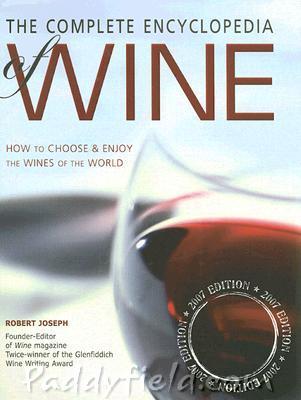By Jim Boyce
Robert Joseph is founder of the International Wine Challenge, author of The Complete Encyclopedia of Wine, editor-at-large for Wine Business International, and a visitor to China since the mid-1980s. I met him in Beijing last Saturday at China World Hotel and asked him about market trends, wine tourism, the pros and cons of blind tastings, and more. (Note: Jebsen Fine Wines hosted Joseph’s visit and arranged for this interview.)
–
Hong Kong dropped its wine tax in February and held a record-breaking wine auction in May; a Chinese company bought a Bordeaux winery last fall; China’s wine imports saw major growth in 2007; and so on. The past year has been a busy one for the local wine scene. What do you foresee over the next few years for the China market?
“I think anything you say here is banal because the China market is exploding but in an interesting way,” he says. Joseph contrasts China with Japan, which he says saw quick growth and a retreat: “Here it seems to be steadier growth and I think it will accelerate.”
 “What is interesting about China, and what is not always appreciated by the outside world, is that you have a very wine-benign government. That’s relevant to Hong Kong which does nothing without a nod from Beijing. There has been for at least a decade a pro-wine approach by Beijing, which is also related to the bio field. China is getting out of grain bio-fuel as a part of the goal to be self-sufficient in grain, and part of this is to get people drinking non-grain alcohol. [This] is one of big boosts to the market here…”
“What is interesting about China, and what is not always appreciated by the outside world, is that you have a very wine-benign government. That’s relevant to Hong Kong which does nothing without a nod from Beijing. There has been for at least a decade a pro-wine approach by Beijing, which is also related to the bio field. China is getting out of grain bio-fuel as a part of the goal to be self-sufficient in grain, and part of this is to get people drinking non-grain alcohol. [This] is one of big boosts to the market here…”
“Distribution here is several light years ahead of, say, India, but is still relatively rudimentary as opposed to what it could or should be. The next phase is further development of the WalMarts and Tescos and of wine getting into the home and away from food and beverage [establishments].”
“Second, people introduced to wine through restaurants will drink more at home where it is more affordable. And third – and this is the elephant in the living room – is Chinese wineries and breweries getting into foreign wine importing. Everyone knows it’s going to happen; it’s just how and where. … If you start bringing these big guys into the picture, then you see something very substantial…”
“I also believe the [imported] bulk wine market will drop. What’s interesting is the leaps the Chinese wineries will go through. They don’t see a disconnect between building a wine industry to produce Chinese wine while using foreign grapes. But at a certain point, rules will be drawn.”
–
Tourism and wine links are found throughout China, whether in terms of resorts at Bodega Langes (Hebei) and Chateau Junding (Shandong), more modest facilities at Grace Vineyard (Shanxi) and Yunnan Red (Yunnan), harvest festivals at wineries, or the upcoming inaugural visit by California-based China Wine Tours. If you updated your Wine Travel Guide to the World, what would you write about China?
“China is going to be huge in tourism in all sorts of ways – ingoing and outgoing. The wineries have deep pockets, so I think wine tourism will and should develop in China, and this itself will help to boost wine consumption and make drinking wine a lifestyle activity.”
“At that point, it will be interesting to see China overtake France, ironically, in the sophistication of its wine tourism, just as Argentina and Chile already have. France, despite developments in Napa Valley, in New Zealand, and elsewhere in the New World, has not learned tourism lessons significantly. Arguably, China is already offering better wine tourism than France.”
–
You wrote in a blog post titled “Discovering the earth to be round” about the once near unanimity of the wine community that, “Wine of any kind can only be produced between the latitudes  of 30 and 50 in the northern or southern hemispheres.” You then stated that Thai “Monsoon” and Brazilian “Sao Francisco” wines, created outside those latitudes, are “more pleasant drink than most cheap Bordeaux.” China also produces wine outside these latitudes. What are the prospects for such wines?
of 30 and 50 in the northern or southern hemispheres.” You then stated that Thai “Monsoon” and Brazilian “Sao Francisco” wines, created outside those latitudes, are “more pleasant drink than most cheap Bordeaux.” China also produces wine outside these latitudes. What are the prospects for such wines?
“The big problem we have here is I don’t know how many Chinese wines I’ve tasted. I know Grace, Sino-French, Dragon Seal and some others [use grapes grown in China], but how many use imported wine, I just don’t know.”
“Although India is way behind China in many ways, the best new latitude wines have come from there. Until very recently, the best would have been Grover Reserve Cabernet Shiraz, which did very well with Decanter [magazine], or Sula Sauvignon Blanc. There have been some broad issues at Grover, with recent tastings not as reliable as before, but I did taste a Sula Shiraz that was very impressive and I think there will be more of those wines. I’ve had some OK wines from Brazil but, again, quality control is not absolutely reliable. The problem of making wines in these new places is that you don’t always have best people doing it…”
“Overall, we need to ask more questions of wine. It doesn’t always have to be Bordeaux-style varieties in 75 centiliter bottles with corks.”
–
What is your general impression of wines made in China and what do you see happening here?
“Grace is way ahead, as Sino-French is not really a commercial winery. Basically, you’re in a Canada pre-VQA situation [in which imported wine is often blended].”
“What I do very much appreciate about China compared to some other countries is that the Chinese know what they don’t know. Chinese wineries will admit to not making wine as good as it will be, to adding imported wine, and to being very pragmatic. What they will be doing in five years will be very different. A lot of Chinese are visiting other parts of world and looking at how things are being done in the wine sector. I would be very unsurprised to see some quantum leaps over next five years, a decade at the outside.”
–
You launched the International Wine Challenge in 1983 with Charles Metcalfe and have been involved in tasting events worldwide, including in China and India. Yet you explained on your blog how easily tasters can be misled. How do you reconcile organizing such tastings on one hand and the reality of taster bias and error on the other?
Wine tasting is a very inexact science. On one hand, you are dealing with human beings who are subject to off-days and prejudices. That’s one reason I prefer a panel to a single critic, because by definition a single palate is subject to these potential preferences.
Wines also behave in various ways. You have the problem with corks, with which I’m getting more and more exasperated. If every time I open six bottles of wine and one of them is different, what does that mean in terms of wine competitions?
Wines also go through phases, getting better or worse as they evolve. And possibly wine tastes different depending on atmospheric pressure, so tasting in mountains is different than at sea level.
I acknowledge all of this, which is why I prefer competitions as a complement to single critics, and why I treat my competitions like the grand prix or tennis circuit. If [tennis player] Roger Federer or [golfer] Tiger Woods or [racecar driver] Michael Schumacher keep coming in the top five in different circumstances and against different opponents, we should have a good idea they must be pretty good. I never said the International Wine Challenge is definitive. We described the wine challenge as like the “Wimbledon of wine competitions.“
–
If you could influence the wine world in three ways, what would they be?
What the planet needs is more open mindedness and acceptance that wine is a short word that covers a big subject. We accept that food runs from a sandwich to a soufflé, that you don’t stand in the street eating a soufflé and you don’t need a knife and fork for a sandwich. We need to have more acceptance that wine can come in a can, bag-in-box, cartons, and can be drunk in different ways. Let’s be much broader in our mindset and see China develop its own wine culture, not a French, English or American one.
I also hope we can get to the point where we learn to trust our own palates and judgments. The wine industry is the only industry in the world bar none which has handed itself over to an American critic. Why should that happen? We have Chateau Lafitte at one end and beverage wine at other end, and we don’t need to listen to American critics or classifications written in France 150 years ago to appreciate it. We need to understand that wine needs to be treated in a broader way. In 1997, when I was in China, I did comparative tasting of Mouton Cadet with Sprite and without Sprite, and I preferred it with Sprite. People should drink what they like and the way they like it.
Grape Wall has no sponsors of advertisers: if you find the content and projects like World Marselan Day worthwhile, please help cover the costs via PayPal, WeChat or Alipay.
Sign up for the free Grape Wall newsletter here. Follow Grape Wall on LinkedIn, Instagram, Facebook and Twitter. And contact Grape Wall via grapewallofchina (at) gmail.com.

Provacative piece. I agree with much of what Robert said, except “China has already overtaken France in wine tourism.” Bollocks! Organizing independent visits to Chinese wineries was the most difficult travel I’ve done in twenty years of visiting vineyards around the globe. I don’t doubt that a handful of China’s commercial wineries will figure out the formula for inbound vistors, but the tourism infrastructure for foreigners is still immature.